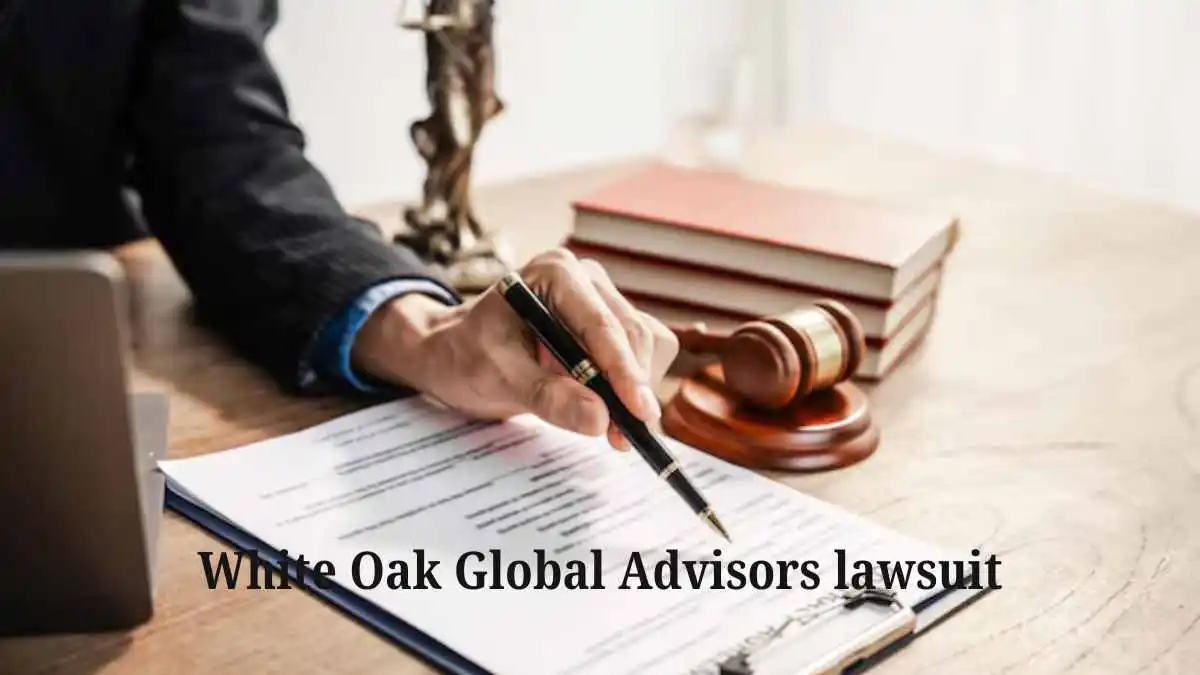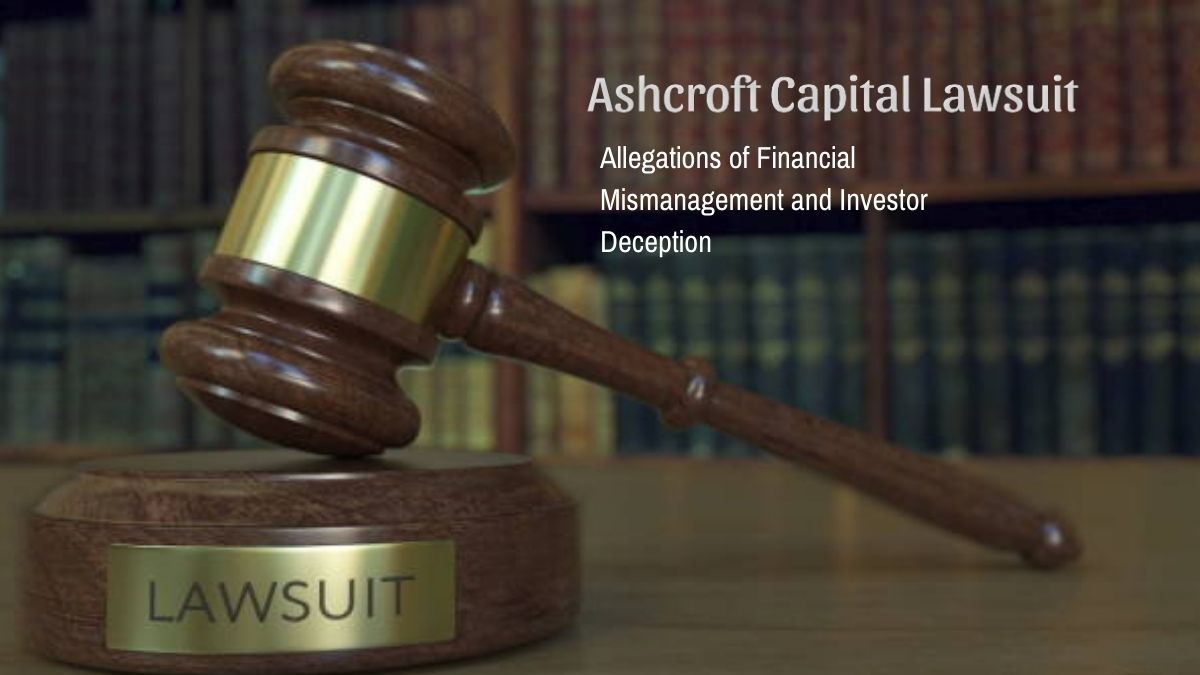LAW
White Oak Global Advisors lawsuit: A Fiduciary Misconduct Case

The White Oak Global Advisors lawsuit has also attracted attention based on the specific nature of the allegations of fiduciary misconduct regarding pension fund. The main ethical issues that are central to the case include self-dealing, where White Oak Global Advisors lawsuit was found to have engaged in activities that put its own interest before that of the clients, by using the client’s property for its own benefits. These actions are said to have resulted in major losses to the New York State Nurses Association Pension Plan (NYSNAPP). The case reached a $140 million settlement considered one of the largest penalties in fiduciary breaches in relation to the Employee Retirement Income Security Act (ERISA). Stemming from this case, this article examines the various aspects, consequences and repercussions of such a scenario.
Background of White Oak Global Advisors lawsuit
White Oak Global Advisors lawsuit, the subject of a breach of contract lawsuit, is a financial services company focusing on various types of investment products primarily on private credit. Formed with a reputation as an innovator, the firm was involved in managing assets for institutional clients such as pension funds, including NYSNAPP. However, claims of fiduciary misconduct did bring its reputation into question and placed it in the spotlight with regards to its operations. While Bridgewater had solid evidence of its successful strategies in managing assets, the lawsuit opened questions about the firm’s ability to govern and follow fiduciary responsibility to its clients. The case provides relevant lessons on the stewardship responsibilities of financial institutions that are usually relied upon to protect customer funds.
New York State Nurses Association Pension Plan (NYSNAPP).
- Pension Plan Overview: It is a defined benefit pension plan that offers retirement benefits to thousands of nurses within New York State to make sure that they have a source of income after retiring.
- Assets under Management: Shared valuable resources with White Oak Global Advisors for efficient management and development as professionals.
- Relationship with White Oak Global Advisor lawsuit: Depend on the expertise of the firm to achieve maximum returns and stable funds.
- Financial Losses: Lack of proper management by White Oak led to huge losses from which the pension plan was greatly impacted.
- Impact on Beneficiaries: The losses raised issues to do with pensions for NYSNAPP members showing the implications of fiduciary malfeasance.
Understanding Fiduciary Misconduct
Fiduciary misconduct refers to a situation where individuals or organizations that handle other people’s property betray their expected responsibility. It encompasses fraudulent activities such as self-serving, recklessness, omission of crucial information among others. In the White Oak Global Advisors lawsuit , Bernsole claimed that fiduciary misconduct involved self-dealing where the firm that offered to purchase NYSNAPP acted without the best interests of NYSNAPP in mind. Such actions were against the fiduciary responsibilities of managing assets for the benefit of beneficiaries as prescribed in ERISA. The lawsuit demonstrates that it is imperative to adhere to fiduciary responsibilities in order to protect and enhance the reputation of the actions performed.
Role of ERISA in Pension Fund Management
The federal statutes governing the administration of pension fund are set out in the Employee Retirement Income Security Act (ERISA). It requires fiduciaries to exercise reasonable care, seek to diversify, and act solely in the interest of the beneficiaries. The White Oak Global Advisors lawsuit is a clear violation of the above principles that led to one of the largest ERISA related settlements. This case shows how ERISA is important in safeguarding retirement benefits, and ensuring that fiduciaries are answerable for their conduct. From the perspective of strengthening governance and transparency, ERISA should also be considered as an effective guard against fraud in the pension business.

Financial Losses and Their Consequences on NYSNAPP
This mismanagement as alleged was catastrophic to the financial wellbeing of NYSNAPP since it was clearly run by White Oak Global Advisors lawsuit. Allegations have it that some pension fund assets were channeled into various high risk operations which did not generate the required returns. Not only does that jeopardize the solvency of the nursing home workers’ fund, but they also put the retirement of thousands of nurses at risk. Thus, the funding burden was accompanied by the loss of trust in the fund among its beneficiaries. When fiduciary duties are breached, this paper also demonstrates the pervasive consequences of these actions with regard to institutional and individual persons on White Oak Global Advisors lawsuit.
Litigation Against White Oak Global Advisors lawsuit
Litigation against the lawsuit has been a process in years and has brought numerous instances of fiduciary misuse. The firm has over the years dismissed these allegations stating that they have complied with the industry norms. But what was revealed in court: documents and other materials, as well as witnesses’ statements spoke the opposite. Finally, the lawsuit accepted to pay the amount of $15 million in other termination fees in order to avoid other legal cases. The $140 million payout is a sign of the types of allegations made against the financial institution and ensures it keeps its employees in check to avoid repeating such a mistake again.
Fiduciary Responsibilities: A Closer Look
Some of the legal responsibilities of a fiduciary in effectiveness of assets are the legal response line with duty of loyalty, duty of care and duty of diversification. In simple terms it wants fiduciaries to undertake their obligations to their investigated subjects with purest of intentions and to act only in the best interest of the their principals and not exploit the given authority for personal gains. Prudence means that one comes up with decisions with so much careful because a decision has to be made in relation to the risks that surround one. The implication of diversification is that risks are also reduced by investment being made in so many other assets. In the case we discuss – White Oak Global Advisors lawsuit, all these responsibilities were alleged to have been violated, with the firm acting in the best interest of the corporate than the clients. ERISA enforcement is critical in maintaining fiduciaries’ responsible for these principles by providing protection to the beneficiaries as well as clients.
Industry-Wide Implications of the Settlement
This White Oak Global Advisors lawsuit was a wakeup call to firms within the financial industry because it forced them to question their fiduciary responsibilities. The lawsuit led to enhanced regulation mainly because authorities called for higher levels of transparency and compliance with ERISA rules. The settlement is a reminder to other asset managers as to the potential fallout inherent in poor management coupled with self-enrichment. For the industry, one might say that White Oak Global Advisors lawsuit stresses the necessity of developing organizational culture of accountability and, principally, the duty to clients.
Conclusion
The White Oak Global Advisors lawsuit litigation is case in financial governance that demonstrates what can happen when fiduciary duties are breached. White Oak Global Advisors lawsuit reveals that any company that violates these fiduciary responsibilities faces fines and penalties of up to $140 million under ERISA. White Oak Global Advisors lawsuit gives financial industry a reason to step up on the issues of transparency, good governance together with ethical issues in the management of client’s funds to eliminate cases of embezzlement. From such cases, the industry can strive to achieve a more accountable and client-focused future.
LAW
5 Essential Questions to Ask Before Hiring an Injury Attorney

Introduction
Accidents can happen when you least expect them. If you’ve been injured, finding the right attorney can make a big difference in your recovery (both physically and financially). A good injury attorney helps you understand your rights, deals with insurance companies, and works to get you the compensation you deserve.
That’s why many accident victims seek the best personal injury attorneys to guide them through the process and protect their rights.
Before hiring a personal injury lawyer, here are five key questions to ask:
Do You Have Experience with Cases Like Mine?
Not all injury cases are the same. Some involve car crashes, others are slips and falls, medical mistakes, or work-related injuries. It’s important to choose an attorney who has handled cases like yours before. They’ll know how to build your case, what kind of evidence is needed, and what challenges to expect.
Experience also matters when it comes to getting results. According to the survey, experience is a key skill lawyers require, as it can improve outcomes for clients. This demonstrates that negotiation skills and experience in similar cases can have a significant impact on the outcome.
What Is My Personal Injury Case Worth?
While no lawyer can promise an exact amount, an experienced one can give you a general idea based on the details of your case. They will consider your medical expenses, lost income, property damage, and emotional suffering. A reliable attorney will be honest about the strengths and weaknesses of your case and help you understand what kind of compensation you may expect.
What Are Your Fees and Costs?
Most personal injury lawyers work on a contingency fee basis. This means they only get paid if you win your case. However, the percentage they charge can vary. Some may also deduct expenses for filing fees, expert witnesses, or medical record requests from your final settlement. Ensure the lawyer clearly explains how fees are calculated and whether any upfront costs are involved.
Will My Case Go to Trial?
Most personal injury cases settle out of court. Still, some do go to trial, especially if the insurance company refuses to offer a fair settlement. A strong attorney should be ready to take your case to court if needed. Trial experience is important because it shows the attorney can fight for your rights in front of a judge and jury if negotiations fail.
How Long Will It Take to Resolve My Case?
Every case is different. Some are resolved in a few months, while others can take a year or more. The timeline depends on the severity of your injury, the duration of your treatment, and the willingness of the other side to settle. A good attorney will give you a rough estimate and keep you informed throughout the process.
Conclusion
Hiring the right injury attorney is a key step in getting justice after an accident. Before making your choice, ask smart questions to understand their experience, fees, and approach to handling your case. Personal injury attorneys can help you feel more confident and better prepared as you move forward with your claim.
LAW
Ashcroft Capital Lawsuit Explained: Allegations of Financial Mismanagement and Investor Deception

The Ashcroft Capital lawsuit has taken on a prominent position as a major legal dispute in the realm of real estate investments. Investors have made public their concerns about how the firm allegedly mismanaged money while presenting inaccurate financial data and failing to act with proper duty. The following article explores every essential aspect of the Ashcroft Capital lawsuit while detailing affirmation points and possible conclusions to clarify why these claims are sparking real estate investment industry commotion.
What Is Ashcroft Capital? A Background on the Real Estate Investment Firm
Since its establishment in 2015, Ashcroft Capital has formed as a real estate investment company dedicated to acquiring and managing multifamily properties within strategic U.S. markets to give investors reliable results from property value increases and rental cash flow. Through excellence in investment opportunities, Ashcroft Capital has established itself as an organization that attracts individual and institutional investors because of the skillful leadership of its founders. A current legal dispute has exposed issues regarding the company’s financial operations, which led to major investor money problems through deceptive forecasting and trust violations.
What Triggered the Ashcroft Capital Lawsuit?
Numerous investors have taken legal action against Ashcroft Capital because the company did not fulfill its monetary commitments. Ashcroft Capital produced deceptive financial forecasts, which led investors to invest based on unrealistic profit expectations. Investors filed a lawsuit against Ashcroft Capital following the release of actual financial results that were lower than their forecasts.
Several specific events appear to have triggered the lawsuit, including:
- A series of property acquisitions by Ashcroft Capital failed to meet the projected financial targets.
- Allegations that certain fees were not disclosed to investors upfront, leading to concerns over the firm’s transparency.
- Claims of inflated property valuations that contributed to unrealistic projections.

Allegations of Financial Mismanagement: What Investors Are Claiming
- Financial mismanagement is at the heart of the Ashcroft Capital lawsuit. Investors argue that the firm misrepresented its ability to manage properties efficiently, leading to unrealistic expectations about the returns they could expect.
- They also claim that funds were poorly allocated, with investment dollars not being used in the manner that was originally promised or outlined in the investment proposals.
- For example, some investors allege that properties were poorly maintained, and renovations were not completed as promised, causing the properties to underperform financially.
- As a result, investors argue that Ashcroft Capital’s financial management practices were not up to industry standards, leading to significant financial losses.
Misleading Financial Projections: Setting Unrealistic Expectations
A severe complaint targets Ashcroft Capital for its deceptive financial forecasting practices given to the investing public. The legal complaint states that the company displayed false return forecasts by using unrealistically high number predictions in all revenue streams, including property valuation and rental income, as well as market expansion calculations.
The projected financial information presented to investors proved to be unrealistic, overlooking crucial market risks such as economic recessions and changes in local real estate conditions. The false numbers gave investors reason to believe they had secured high-yield options, although the actual financial returns ultimately fell short of expectations.
Lack of Transparency in Fees and Expenses
A major component of the legal action concerns Ashcroft Capital’s failure to disclose the entire range of costs associated with investment fees. The Ashcroft Capital lawsuit alleges that Ashcroft Capital failed to disclose all fees associated with management expenses, including transaction costs, as well as undisclosed costs that could impact investment returns.
The lawsuit raises questions about whether Ashcroft Capital’s fee amounts matched typical prices in the real estate investment sector or if these fees were unjustifiably high. The lack of visible, detailed explanations regarding these costs has triggered accusations of financial fraud.
Concerns Over Inflated Property Valuations
Real estate investment heavily relies on property valuation, as it determines projected returns. The investors accuse Ashcroft Capital of manipulating property evaluations, which enables the company to report increased returns to shareholders.
Some investors say the properties received dishonest value distributions to boost impressionable return measurements. The inaccurate valuations of properties made investors perceive incorrect profit potential on their acquisitions.
The concern for investors stems from inflated property valuations because they alter true investment worth and create unachievable yield expectations that end in dissatisfied results after returns fail to materialize.
Legal Proceedings: Current Status of the Ashcroft Capital lawsuit
The court proceedings continue without a definitive judgment being reached at present. At the initial case stages, Ashcroft Capital maintained that their business strategies and market research stood on solid ground following industry norms. The plaintiffs demand monetary compensation that involves both reimbursement of investment losses and punitive damages.
This ongoing case will continue to receive public notice both for its particular claims against Ashcroft Capital and for its effects on the real estate investment sector. Law professionals anticipate the judgment to determine critical boundaries regarding investment company liability standards.
Potential Outcomes and Consequences for Ashcroft Capital
Ashcroft Capital will need to pay financial penalties to investors after court approval for their alleged mismanagement, combined with deceptive practices, that affected the investors. Ashcroft Capital may need to modify its operating procedures, combined with increased transparency, which will enhance its responsibility to investors throughout future investments.
Ashcroft Capital would suffer significant harm to its public image when working with investors because of this lawsuit. Future investments and client acquisition could become difficult for the firm if it is convicted of mismanagement and fraud.
Lessons for Investors: How to Protect Yourself from Similar Risks
Ashcroft Capital lawsuit highlights the importance of due diligence when investing in any firm, especially in complex sectors like real estate. Investors should always:
- Carefully examine the financial projections provided by the firm.
- Investigate fees and expenses to ensure full transparency.
- Assess the credibility and track record of the firm’s leadership.
- Ask about the valuation methods used for property acquisitions and ensure they are realistic.
Being proactive and vigilant can help investors avoid potential pitfalls and make more informed decisions.
Industry Impact: What This Case Means for Real Estate Investing
The Ashcroft Capital lawsuit causes the real estate investment community to experience severe shock because it challenges fundamental issues regarding corporate governance, along with investor protection. A successful lawsuit outcome would create a significant opportunity to reassess the real estate investment sector, thus increasing the level of rules and transparency in real estate markets.
The lawsuit might transform future real estate transaction structures, so businesses need to provide clear information regarding risks and all associated fees and projections.
Investor Reactions and Community Sentiment
The legal action against Ashcroft Capital received conflicting reactions from investors. The case produced different opinions among investors because some see the industry’s problems, yet others still back Ashcroft Capital, expecting them to win their court battle.
Investors show growing skepticism regarding opaque companies that fail to systematically account for business risks.
Final Thoughts: The Importance of Corporate Accountability
Ashcroft Capital litigation reveals how vital it is to hold investment companies accountable for their operations. Investors must require all financial firms under their trust to demonstrate complete transparency, accurate projection results, and solid ethical conduct. The case shows how investors bear essential responsibility to conduct thorough checks and maintain financial decency throughout the investment sector.
In the end, this lawsuit is more than just a legal battle—it is a call for reform in how real estate investments are handled and a reminder of the importance of trust and integrity in the investment sector.
LAW
How Whistleblowers Shape Corporate Accountability in Today’s Workplace

Who Is Considered a Whistleblower?
Whistleblowers are individuals, often current or former employees, who choose to reveal illegal, unethical, or unsafe behaviors taking place within an organization. Their motivations can stem from witnessing fraud, financial misreporting, environmental violations, or risks to public safety. Whistleblowers may come from any industry or level of employment, and their revelations frequently serve as the catalyst for reforms and accountability. Some of the most influential whistleblower cases in history have involved people with unique insight into their organizations or the courage to come forward under immense pressure.
The decision to step forward is rarely taken lightly, as it can carry significant personal and professional risks. For those in need of guidance, informative resources like https://ifightforyourrights.com/whistleblower-lawyer/ help individuals understand how to protect themselves and navigate the legal system. In fact, data from the Ethics & Compliance Initiative shows that as many as 42% of employees have observed misconduct. Among these individuals, a meaningful percentage decide to report, leading to investigations and, at times, landmark settlements or industry reforms. When ordinary people act as whistleblowers, they help safeguard consumers, protect the public, and keep organizations accountable.
The Motivation to Speak Up
Speaking up against misconduct requires a blend of personal conviction and a sense of civic duty. In some cases, whistleblowers hope to shield coworkers, customers, or even entire communities from harm. Others are motivated by direct impacts on their own work environment, such as unfair labor practices, unsafe conditions, or financial improprieties threatening job security. While some individuals take time debating internally whether to report, one frequent deciding factor is the presence of an organizational culture that rewards honesty and ethical behavior.
Studies consistently show that people are far more likely to report wrongdoing when they believe their concerns will be heard and fairly addressed. Most employees who raise concerns feel it is the right thing to do, particularly when supported by clear ethics programs and transparent leadership. When organizations lack a meaningful process, silence often prevails, leaving damaging problems unsolved and trust eroded. Real-world whistleblowers show that even in the face of personal or professional risks, the desire to make a difference can prove stronger than the fear of reprisal.
Legal Protections and Risks
Legal frameworks such as the Sarbanes-Oxley Act, Dodd-Frank Act, and various state-level statutes are meant to protect whistleblowers, providing remedies for retaliation and, in some cases, financial incentives for critical disclosures. These laws work to shield individuals from discrimination, wrongful termination, or intimidation in response to their actions. Nevertheless, the legal process can be complex and is not always straightforward. Some find protection inconsistent, and the burden of proof may still fall heavily on the whistleblower.
Those contemplating a whistleblowing act should familiarize themselves with the rights and protections specific to their industry and jurisdiction. The OSHA Whistleblower Protections page provides a straightforward overview of how federal laws safeguard individuals who report safety, environmental, and financial misconduct. Gathering strong documentation and seeking confidential legal counsel can significantly reduce exposure to risks. Many experts recommend keeping detailed, time-stamped records and communicating through appropriate channels to preserve anonymity and protect oneself from retaliation.
High-Profile Whistleblower Cases
Many of the most transformative changes in corporate policy, compliance, and even federal regulation have roots in whistleblower activity. Recent cases have included the exposure of corporate fraud at large financial institutions, revelations about defective medical equipment, and reporting of unsafe environmental practices. These incidents have led to significant penalties, sometimes in the billions of dollars, against organizations found to be in violation.
Importantly, these stories are not only about legal victories or monetary settlements. They often spark industry-wide reflection and serve as a warning to other companies to bolster transparency and compliance. Whistleblowers help establish precedents, shaping law, business practices, and even perception in society regarding the responsibility organizations have to the broader public. Cases that make headline news provide rare insights into the normally opaque world of corporate decision-making and can result in new protections for both consumers and employees.
The Value of Internal Reporting Cultures
Companies that foster a culture of trust and ethical openness differentiate themselves from organizations where employees are hesitant to speak up. An effective internal reporting structure allows concerns to be raised—and resolved—before they escalate to external authorities or become public scandals. According to NAVEX’s 2023 Workplace Ethics and Compliance Benchmark Report, companies with well-communicated, anonymous reporting channels experience higher rates of early intervention, ultimately resulting in fewer severe incidents and fewer regulatory fines.
Internal hotlines, online portals, and recurring ethics training sessions are common strategies adopted by organizations that prioritize transparency. Employees who feel their voices are respected are less likely to fear retaliation, making them more likely to step forward with crucial information. A healthy workplace environment not only mitigates legal and reputational risks but also boosts morale, productivity, and retention rates across teams.
How Companies Respond and Adapt
Company reactions to whistleblower disclosures range widely, from positive engagement to dismissive or even punitive responses. Organizations that adopt constructive strategies typically open investigations promptly, communicate results transparently with staff, and treat all parties involved with respect. These companies also tend to review policies after an incident, conducting thorough risk assessments and implementing additional training or safeguards to prevent future issues. Over time, such practices build trust and contribute to the organization’s long-term health.
On the other hand, poor or hostile responses—such as retaliating against the whistleblower, suppressing evidence, or delaying investigations—rarely stay hidden for long. With the prevalence of digital communication and rapid news cycles, inadequately handled complaints can quickly become public, damaging a company’s reputation and bringing regulatory scrutiny. The best organizations learn from each incident, using whistleblower reports as feedback for continuous improvement and ethical growth.
Practical Tips for Potential Whistleblowers
- Carefully document all relevant incidents, communications, and evidence in a secure, date-stamped format.
- Educate yourself on whistleblower laws and protections applicable to your location and industry.
- Whenever possible, utilize internal compliance or ethics reporting channels before reaching out to external bodies, unless the risk of retaliation is high or the law requires external disclosure.
- Seek advice from experienced legal counsel or reputable organizations specializing in whistleblower support, many of which offer confidential consultations.
- Always respect company confidentiality agreements, but understand that some forms of wrongdoing are protected disclosures under the law.
For those exploring their legal rights, resources like this whistleblower lawyer resource can provide additional clarity and assistance in navigating these complex issues and making well-informed decisions.
The Future of Corporate Accountability
As the role of whistleblowers continues to expand, industries are increasingly recognizing the value of transparency and proactive compliance. Societal attitudes have shifted to appreciate and support whistleblowers who place the greater good above the status quo. Legal and regulatory frameworks are also evolving, offering more robust protections and sometimes even incentives for those willing to come forward.
For the latest trends and ongoing policy changes, A window into how these individuals drive discussions around integrity, risk management, and workplace ethics. By implementing transparent practices and encouraging open channels for reporting, organizations set the stage for ethical success. At the same time, employees, equipped with knowledge and protections, can act as catalysts for meaningful change.
-

 BIOGRAPHY1 month ago
BIOGRAPHY1 month agoBehind the Scenes with Sandra Orlow: An Exclusive Interview
-

 HOME7 months ago
HOME7 months agoDiscovering Insights: A Deep Dive into the //vital-mag.net blog
-

 HOME10 months ago
HOME10 months agoSifangds in Action: Real-Life Applications and Success Stories
-

 BIOGRAPHY8 months ago
BIOGRAPHY8 months agoThe Woman Behind the Comedian: Meet Andrew Santino Wife


































